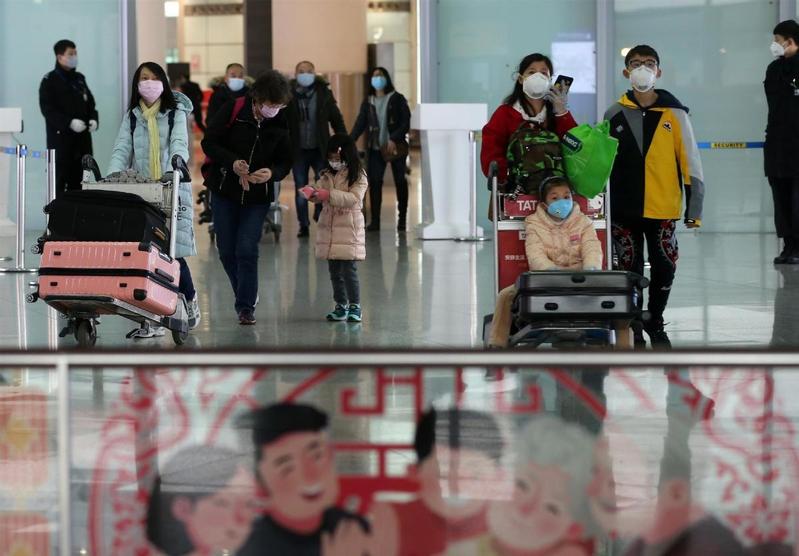 Travelers exit the Beijing Capital International Airport on Sunday. (WANG ZHUANGFEI / CHINA DAILY)
Travelers exit the Beijing Capital International Airport on Sunday. (WANG ZHUANGFEI / CHINA DAILY)
With the end of the extended Lunar New Year holiday on Sunday and a large number of travelers hitting the road or boarding flights, China has stepped up disinfection, ventilation and screening measures in public spaces to contain the novel coronavirus outbreak that could be magnified due to the increased population mobility.
People in large parts of China are scheduled to resume work on Monday since the State Council, China's Cabinet, decided on Jan 27 to extend the weeklong holiday by three days to Sunday
People in large parts of China are scheduled to resume work on Monday since the State Council, China's Cabinet, decided on Jan 27 to extend the weeklong holiday by three days to Sunday.
The National Health Commission has released disease prevention protocols targeting different methods of transportation to block the disease spread, including increasing frequency of disinfection, improving ventilation in enclosed spaces and distributing seats loosely to reduce large groupings, Wang Bin, an official with the commission, said at a news conference on Sunday.
"In public areas such as office buildings, temperature checks and registration of visitors should also be scaled up to limit possible spread of the virus," she added.
The overall flow of passengers on the road during the Lunar New Year Holiday is significantly smaller compared to past years.
According to the China Railway Corporation, about 3 million passenger trips were expected to be made by rail on Sunday, down by 74.4 percent compared to the previous year.
On Saturday, less than 2.15 million trips were made by rail, down by 82.2 percent from last year, the company said.
The company added that all railway stations across the country have set up temperature checkpoints to monitor inbound and outbound travelers, and feverish passengers detected on the train will be immediately isolated and transferred to the nearest facilities for medical observation.
The numbers of passengers traveling by road, waterway or air on Saturday had all declined by 76 to 93 percent year-on-year, according to the Ministry of Transport.
The Beijing Capital International Airport was expected to handle 115,100 trips on 947 flights on Sunday, down by 61 percent and 44 percent respectively compared to last year.
ALSO READ: Various measures taken for epidemic prevention across China
The airport is now equipped with 49 pieces of temperature-monitoring equipment and has intensified disinfection efforts targeting areas exposed to passengers who run a fever during the journey.
In Beijing, based on ticket-booking records, it is estimated that passenger trips made by rail and air will each decline by 70 percent in the near future, according to Rong Jun, deputy director of the Beijing Municipal Transport Commission.
He added that more staff will be added to the subway system to control rider flow and decrease the density of passengers on board in a bid to limit the spread of the virus.
Currently, subway stations are disinfected five times a day and subway cars are disinfected twice a day. In addition, maximum ventilation efforts have been implemented, Rong said.
In Shanghai, all people arriving in the city through highways, railways, airports and docks are required to fill out a mandatory health form as of Sunday.
Companies in Shanghai are not allowed to resume production before Feb 9, the municipal government said last week.
READ MORE: On the front line, with no time to spare
In Hubei province, the epicenter of the outbreak, the provincial government has extended the holiday to Feb 13.


